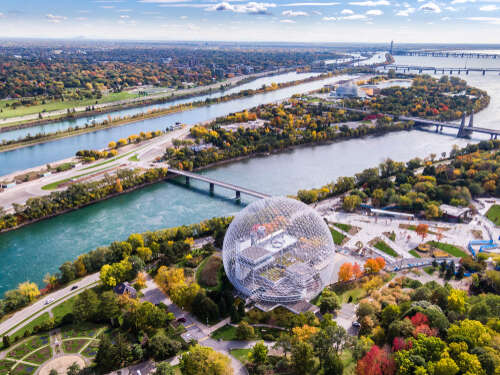
In the face of escalating climate challenges, a recent study by CBRE EA has shed light on the commendable efforts of several North American cities that are not only weathering the storm but also taking significant steps towards sustainability and climate change resilience.

The North American City Sustainability Study evaluated 66 cities, assessing their preparedness against transition risk, physical climate risk, and the effectiveness of mitigation and adaptation strategies.
Top 10 climate-resilient cities
The study has identified ten North American cities that stand out as models of climate change resilience, possessing the determination to withstand the dual onslaught of transition and physical climate risks. These cities have showcased unique strategies and policies to protect property values and enhance their inhabitants’ quality of life. Among the cities that have distinguished themselves, a few noteworthy names emerge:
- Austin – net-zero target year 2040: Rapid urbanisation often comes hand-in-hand with environmental challenges. Austin, one of the fastest-growing cities in the US, has confronted its sustainability hurdles with impressive resolve. Facing issues like air pollution and heating degree days, Austin has significantly ramped up its renewable energy sources to power the city. Building performance standards and efficient requirements have also been put in place to mitigate climate risks.
- Boston – carbon-neutral target year 2050: Boston has demonstrated its commitment to safeguarding its extensive coastline through the Climate Ready Boston initiative. As a major metropolitan area, Boston has embraced government policies and regulations that bolster adaptation and mitigation endeavours. The city’s innovative approach includes harnessing renewable energy, certifying a substantial portion of commercial buildings under LEED, and backing climate-related projects with green bond funding.
- Denver – net-zero target year 2040: Despite challenges like water stress, Denver has implemented numerous measures to tackle the impacts of climate change. A focus on renewable energy, green bond funding, and LEED certification for commercial buildings has positioned Denver as a resilient city. The city’s benchmarking and disclosure regulations for energy performance underscore its dedication to sustainability.
- Montreal – carbon-neutral target year 2050: Montreal shines as a model of how renewable energy, particularly hydroelectric power, can drive sustainability. With almost 99% of its electricity usage sourced from hydropower plants, Montreal’s carbon-neutral aspirations appear within reach. Positive indicators in air quality, coupled with an emphasis on green-bond programmes for local climate projects, make Montreal stand out in the climate-resilient arena.
- New York City – carbon-neutral target year 2050: New York City has long been a trailblazer in urban resilience efforts. Despite challenges posed by air pollution, the city has taken decisive steps, enacting stringent decarbonisation mandates for buildings. An increasing share of renewable energy, LEED certifications for commercial buildings, and a green bond programme highlight the city’s dedication to long-term sustainability.
- Ottawa – net-zero target year 2050: Ottawa‘s commitment to sustainability is evident through improved air quality and resilient measures. The city’s substantial reliance on hydropower plants contributes to its remarkable share of renewable energy. Backed by a strong green bond programme Ottawa’s dedication to local climate projects is commendable.
- San Francisco – net-zero target year 2040: San Francisco has taken a comprehensive approach to climate resilience, boasting a Climate Action Plan aimed at both reducing greenhouse gas emissions and bolstering adaptation efforts. Despite its vulnerability to natural hazards like earthquakes, the city is progressively increasing its renewable energy sources. A significant portion of commercial buildings holds LEED certification, emphasising San Francisco’s commitment to sustainable development.
- Toronto – net-zero target year 2040: Toronto‘s focus on reducing water stress and embracing renewable energy has resulted in positive outcomes. With a significant reliance on renewable energy sources and a growing number of LEED-certified commercial buildings, Toronto showcases a determined effort to enhance climate resilience. Measures to counter air pollution underscore the city’s holistic approach to sustainability.
- Washington, DC – carbon-neutral target year 2045: Washington DC shines in its focus on building energy efficiency and sustainable development practices. While dealing with challenges like air pollution, the city has steadily increased its reliance on renewable energy sources, a trend reflected in the increasing share of renewable energy powering the city. With a significant number of LEED-certified buildings, the nation’s capital is fostering a greener urban environment.
- Winnipeg – net-zero target year 2050: Winnipeg‘s commitment to sustainable practices is evident through a comprehensive Climate and Green Plan. The city’s efforts have resulted in decreased air pollution and heating degree days, while water stress remains low. With a substantial portion of electricity sourced from renewable energy, and LEED certifications for commercial buildings, Winnipeg sets a good example.
Collaborative strategies for a sustainable future
These cities have been cited as beacons of possibility in a world grappling with the consequences of climate change. Their resilience experiences highlight the importance of adopting a multifaceted approach, integrating renewable energy, innovative building codes, and targeted investments into climate projects.
The CBRE EA Sustainability Study showcases that by nurturing resilience, North American cities can cultivate a more sustainable and secure future.
[Read more: Why we must design at a neighbourhood scale to cool our cities]






